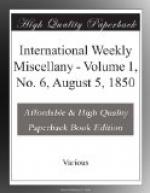As a professor, Dr. Burns was highly popular. He had a cheerful and attractive manner, and was fond of bringing in anecdotes more or less applicable, but always enlivening. His language was plain and clear, but not always correct or elegant. In personal appearance, he was of the middle size, of an anxious and careworn, but gentlemanly and intelligent, expression of countenance. In 1830, he published Principles of Surgery, first volume, which was followed by another. This work is confused, both in style and arrangement, and has been very little read, but it did credit to his zeal and industry, for he had now acquired fame and fortune, and had long had at his command the most extensive practice in the west of Scotland. John Burns, the younger, had written and published a work on the evidences and principles of Christianity, which was extensively read, and went through many editions. His name was not at first on the title-page, but that it was the production of a medical man was obvious. He gave a copy to his father, who shortly after said, “Ah, John, I wish you could have written such a book!” Dr. Burns has many friends in the United States, who were once his pupils. One of the most eminent of them is Professor Pattison of the Medical Department of the New York University, in this city.
* * * * *
HORACE SUMNER.
This gentleman, one of the victims of the lamentable wreck of the Elizabeth, was the youngest son of the late Charles P. Sumner, of Boston, for many years Sheriff of Suffolk county, and the brother of George Sumner, Esq., of Boston, who is well known for his legal and literary eminence throughout the country. He was about twenty-four years of ago, and has been abroad for nearly a year, traveling in the south of Europe for the benefit of his health. The past winter was spent by him chiefly in Florence, where he was on terms of familiar intimacy with the Marquis and Marchioness d’Ossoli, and was induced to take passage in the same vessel with them for his return to his native land. He was a young man of singular modesty of deportment, of an original turn of mind, and greatly endeared to his friends by the sweetness of his disposition and the purity of his character.—Tribune.




